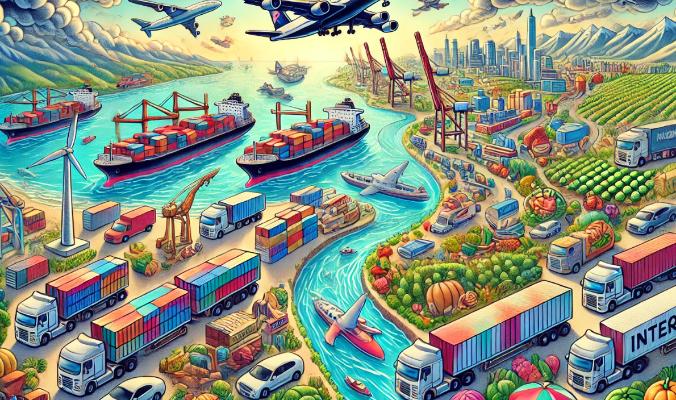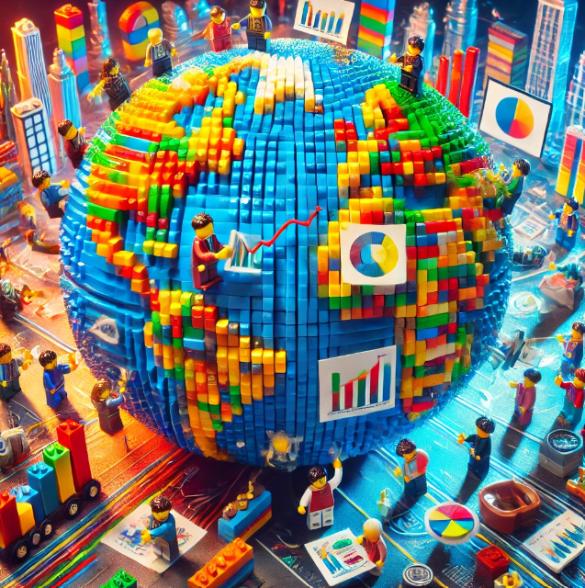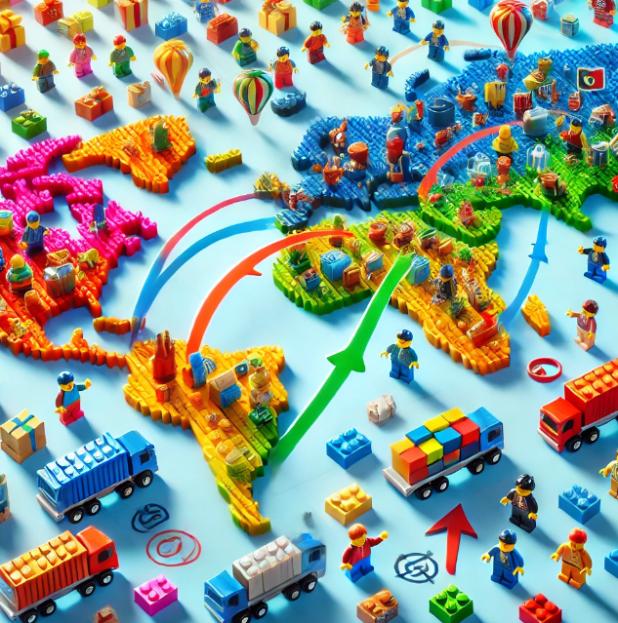IGCSE 0455 ECONOMICS
Unit 6 International Trade
What is IGCSE International Trade

READY FOR SOME IGCSE ECONOMICS?
IGCSE Economics Unit 1
The Basic Economic Problem
Cambridge 0455
IGCSE Economics Unit 2
Allocation of resources
Cambridge 0455
IGCSE Economics Unit 3
Microeconomics
Cambridge 0455
IGCSE Economics Unit 4
Macroeconomics
Cambridge 0455
IGCSE Economics Unit 5
Economic development
Cambridge 0455
IGCSE Economics Unit 6
International trade
Cambridge 0455
Why You’ll Love Unit 6 International Trade IGCSE
I thought more trade was good! So, how come Donald Trump seems to be taking us back to a time of less international trade and a higher degree of self-sufficiency? Does this mean we’ll soon be making our own shoes and hunting wildebeest?
Unit 6 International Trade in the IGCSE Economics course is one of the most dynamic and globally relevant topics you’ll study. This unit dives deep into how and why countries trade, the benefits and challenges of globalization, and the growing complexities of modern trade systems. Whether you’re looking to revise Unit 6 International Trade or discover why trade wars and supply chain disruptions dominate the news, this unit connects classroom theory to real-world events shaping our economy.
What’s in Unit 6 International Trade?
This unit explains how trade allows countries to specialize in producing what they’re best at and exchange it for goods and services they lack. Known as comparative advantage, this concept has fueled global economic growth and innovation. For example, countries like China have leveraged their manufacturing strengths to dominate exports, while Germany excels in producing high-quality machinery and vehicles. But trade isn’t always smooth sailing. Recent events, such as Brexit and U.S.–China trade disputes, reveal the political and economic tensions that come with international exchange.
A fascinating part of Unit 6 Trade Economics is learning about protectionism—the policies some governments use to restrict imports and shield domestic industries. This was a hot topic when Donald Trump imposed tariffs on steel and aluminum imports, sparking a trade war with China. While protectionism might save jobs in certain industries, it often leads to higher prices for consumers and retaliatory measures that harm global trade. Understanding these dynamics helps students appreciate why open trade policies are crucial but also why some countries are hesitant to fully embrace globalization.
IG Trade also explores the balance of payments—a key economic indicator that shows the financial transactions between a country and the rest of the world. A surplus might indicate strong exports, while a deficit could suggest over-reliance on imports. For example, the U.S. has run trade deficits for decades, sparking debates about whether this weakens its economy or reflects its ability to afford high levels of consumption.
Why is International Trade Important?
International trade isn’t just about exchanging goods—it’s about creating opportunities. For developing countries, trade can be a pathway to economic growth. Vietnam, for instance, has become a major exporter of electronics and garments, lifting millions out of poverty. On the other hand, some nations struggle to compete in global markets. Many African countries, reliant on exporting raw materials like oil and cocoa, face volatile prices that hinder long-term development.
In Unit 6 Trade Economics, you’ll also examine the role of international organizations like the World Trade Organization (WTO). These institutions aim to promote fair trade and resolve disputes, but critics argue they sometimes prioritize wealthy nations’ interests over developing economies. This makes for lively debates in the classroom as students weigh the pros and cons of globalization and global trade governance.
Connecting International Trade to Your Future
This unit goes beyond memorizing trade theories. It’s about understanding the global economy and how it impacts your future. Think about your favorite tech gadgets—they likely involve components and labor from multiple countries. Understanding trade policies helps you see how these products are made, priced, and delivered. As you revise Unit 6 International Trade, you’ll gain insights into careers in trade, logistics, and international business, fields that are vital in a globalized world.
Lastly, the environmental aspect of trade is becoming increasingly important. Transporting goods across continents generates significant carbon emissions, leading to calls for sustainable trade practices. In this unit, you’ll learn how governments and businesses are addressing these challenges while balancing economic growth with environmental sustainability.
Revise Unit 6 International Trade Today
Whether you’re preparing for exams or curious about global economics, IGCSE Economics Unit 6 offers a comprehensive view of international trade. From the benefits of specialization to the controversies of protectionism, from trade surpluses to the environmental costs of globalization, this unit provides you with the knowledge to understand one of the most critical aspects of modern economics. So dive into the world of IG Trade—it’s not just about numbers and theories; it’s about understanding how the world connects and why that connection matters.



